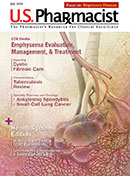Birmingham, AL—Exactly when to begin medication therapy for stage 1 hypertension has sometimes been difficult to determine. A new study now recommends that a person’s long-term, 30-year risk as well as short-term, 10-year risk should be considered to make that determination.
A comparison of the two risk-prediction tools used to calculate the risk of developing cardiovascular disease (CVD) led to that suggestion. The results were published in the journal Hypertension.
“Many people may not have a heart attack or stroke, or develop heart failure in the next few years, yet they may benefit from lowering their blood pressure to protect them against having a heart attack, stroke or heart failure later in life,” said lead author Paul Muntner, PhD, MHS, a visiting professor in the Department of Epidemiology at the University of Alabama at Birmingham. “Experts who develop cardiovascular disease guidelines may want to consider both near-term risk and lifetime risk for having heart disease, stroke and heart failure in lifestyle changes and treatment recommendations.”
The 2017 American College of Cardiology/American Heart Association (AHA) blood pressure guideline recommends initiation of antihypertensive medication for adults with stage 1 hypertension—defined as systolic blood pressure of 130 mmHg to 139 mmHg or diastolic blood pressure of 80 mmHg of 89 mmHg—and 10-year atherosclerotic cardiovascular disease (ASCVD) risk of 10% or greater estimated by the pooled cohort equations (PCEs). The AHA published the predicting risk of cardiovascular disease events (PREVENT) equations in 2023 to estimate ASCVD and total CVD risk.
For this study, researchers analyzed U.S. National Health and Nutrition Examination Survey data from 2013 to 2020 for 1,703 adults aged 30 to 79 years with stage 1 hypertension but without self-reported CVD. The study team estimated 10-year ASCVD risk by the PCEs and 10-year ASCVD and total CVD risk by the base PREVENT equations.
The results indicated that mean 10-year ASCVD risk was 5.4% (95% CI, 5.0%-5.9%) and 2.9% (95% CI, 2.7%-3.1%) using the PCEs and PREVENT equations, respectively.
“The proportion with 10-year ASCVD risk of 10% to <15% and ≥15% was 8.1% and 7.8% estimated by the PCEs, respectively, and 3.0% and 0.3% estimated by the PREVENT equations, respectively,” the authors reported. “No participants had a 10-year ASCVD risk ≥10% on the PREVENT equations and <10% on the PCEs, while 12.5% had a 10-year ASCVD risk ≥10% on the PCEs and <10% on the PREVENT equations. The mean 10-year total cardiovascular disease risk estimated by the PREVENT equations was lower than the mean 10-year ASCVD risk on the PCEs.”
That led to the conclusion that among adults with stage 1 hypertension, the 10-year predicted ASCVD risk estimated by the PREVENT equations was approximately one-half the risk estimated by the PCEs.
The comparison determined that if only the current 10-year risk thresholds are applied, fewer adults might be recommended for blood pressure–lowering medication. The researchers suggested that PREVENT can additionally be used to calculate an individual’s 30-year risk for CVD, which the Pooled Cohort Equations cannot calculate. The researchers added that the Pooled Cohort Equations also do not include heart failure or additional risk factor predictors of kidney function or statin use.
The article pointed out that PCEs were designed to assess 10-year risk of heart attack and stroke for individuals aged 40 to 79 years but that PREVENT can assess CVD risk in individuals from aged 30 to 79 years and heart attack, stroke, and/or heart failure over the next 10 years and 30 years.
Some people who did not qualify for hypertension medication with the PCE calculation had a high risk for heart attack, stroke, and heart failure over the next 30 years, according to the study team. The team noted that 55.3% of adults who had a high 10-year risk with the PCEs had a low 10-year risk using PREVENT; however, the 30-year risk was ≥30%—which may be considered high risk.
“Many people with stage 1 high blood pressure who are not likely to have a heart attack, stroke, or heart failure within the next 10 years may have a high risk over the next 30 years,” Dr. Muntner said. “People may want to discuss this with their doctors and consider starting antihypertensive medication to lower their blood pressure to reduce their risk for heart attack, stroke and heart failure across their lifetime even if they have a low short-term risk.”
The content contained in this article is for informational purposes only. The content is not intended to be a substitute for professional advice. Reliance on any information provided in this article is solely at your own risk.
Published July 24, 2024






